History
We the People of the United States, in Order to form a more perfect
Union, establish Justice, insure domestic Tranquility, provide for the
common defense
promote the general Welfare, and secure the Blessings of Liberty to
ourselves and our Posterity, do ordain and establish this Constitution
for the United States of America.
~Preamble to the United States Constitution
"Never have those words been more profound...especially after what we learned about the history of the debates and diplomacy that occurred during the Constitutional Convention of 1787 in Philadelphia..."
~Darien Tauiliili and Kofesina Pula (Tafuna High School Class of 2012)
Revolutionary War of 1775-1783
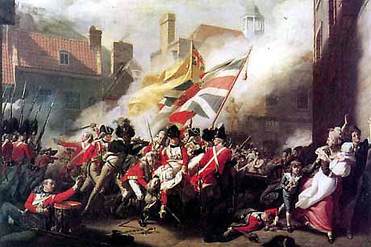
British troops during the American Revolution.
The American Revolutionary War of 1775 set the stage for Americans to fight the oppression of British rule, infringements on their civil liberties, claim their independence, and most importantly decide on how to govern themselves. The Americans won the war and were left with the charge of establishing a new independent nation.
Articles of Confederation 1776-1781
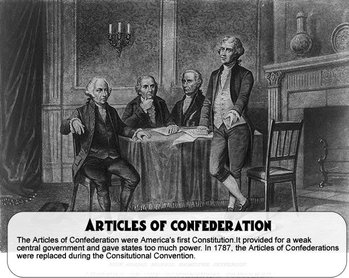
The Articles of Confederation,
the first Constitution of the United States of America, was drafted in June of
1776 and was ratified by 1781. This constitution allowed states to keep rule of their own affairs. Although many Americans were satisfied with this constitution, many Americans realized that the nation as a whole was weak because it had not power to tax, police affairs of individual states, and regulate commerce between states and abroad. The Constitutional Convention was called to revise the Articles of Confederation.
Shay's Rebellion 1786-1787
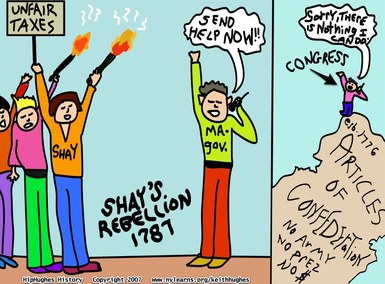
One of the main turning points that led to the Constitutional Convention in Philadelphia was Shay's Rebellion in 1787. Shay's Rebellion, named after Daniel Shay, was a revolt led by poor farmers in Massachusetts because they were "unfairly taxed". The Rebellion of more than 1,000 poor farmers on the state government of Massachusetts, and the lack of power of a national army to quash the rebellion, forced many wealthy Americans to realize that the Articles of Confederation were inadequate in establishing a strong country to protect their interests.
One poor farmer who joined Shay's Rebellion, Plough Jogger, helped reveal their strife and dissatisfaction with taxation when he uttered these words:
"I have been greatly abused, have been obliged to do more than my part in the war, been loaded with class rates, town rates, province rates, Continental rates and all rates...... great men are going to get all we have and I think it is time for us to rise and put a stop to it, and have no more courts, nor sheriffs, nor collectors nor lawyers."
One poor farmer who joined Shay's Rebellion, Plough Jogger, helped reveal their strife and dissatisfaction with taxation when he uttered these words:
"I have been greatly abused, have been obliged to do more than my part in the war, been loaded with class rates, town rates, province rates, Continental rates and all rates...... great men are going to get all we have and I think it is time for us to rise and put a stop to it, and have no more courts, nor sheriffs, nor collectors nor lawyers."
Call to the Convention
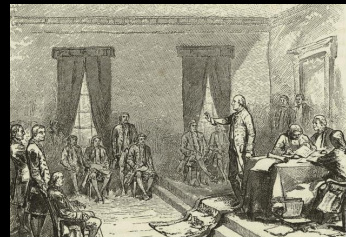
Fifty-five Delegates from 12 colonies met to discuss the revisions of the Articles of Confederation in June of 1787, in Philadelphia. Rhode Island delegates did not attend. The main goal of the meeting was to establish a stronger central or Federal Government that could collect taxes, raise an army, and regulate trade between the states and abroad. They also met to discuss issues on how the powers of the new government would differ than those in the Articles of Confederation.
Founding Fathers...
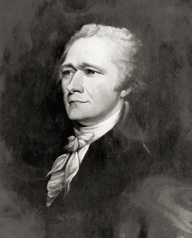
Alexander Hamilton is credited to be the Father of the Constitution mainly because he was the one who helped galvanize delegates from many of the states even during the Revolutionary War to propose that America had to have a strong Central Government in order to survive. He believed that the Articles of Confederation were too weak, and Shay's Rebellion in 1787 was just the event to help Hamilton prove his point. He rallied many influential elite, including George Washington, Benjamin Franklin, John Jay, and James Madison to call for the Constitutional Convention in 1787.
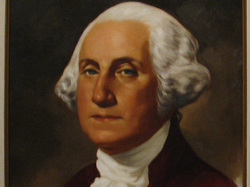
George Washington was one of the most influential men of his time because of his wealth, and leadership abilities displayed when he became General of the Confederate Army that led the American militia to defeat the British Army in the American Revolutionary War. George Washington was nominated to preside as President over the Constitutional Convention in 1787.
Carol Berkin: Presidential Professor American Colonial and
Revolutionary History; Women's History
~Weissman School of Arts and Sciences~
" ...the convention is really the brainchild of Alexander Hamilton. He has been pushing for what in the 18th century they call, 'a vigorous or energetic government'...for since even actually before the Americans won the war. He is opposed to the Articles, he thinks that this will fail. He quickly brings to his side men like Washington, John Jay, Madison, John Adams, Benjamin Franklin, who all, also see that the Confederation government is going to be inadequate for what the nation needs as opposed to what the Revolution might have needed."
Revolutionary History; Women's History
~Weissman School of Arts and Sciences~
" ...the convention is really the brainchild of Alexander Hamilton. He has been pushing for what in the 18th century they call, 'a vigorous or energetic government'...for since even actually before the Americans won the war. He is opposed to the Articles, he thinks that this will fail. He quickly brings to his side men like Washington, John Jay, Madison, John Adams, Benjamin Franklin, who all, also see that the Confederation government is going to be inadequate for what the nation needs as opposed to what the Revolution might have needed."
link to the full version of this video on www.youtube.com: click here